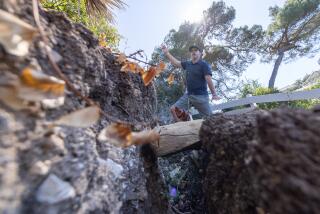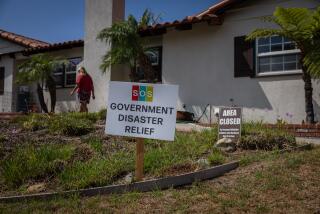A Danger in Forgetting
The Christmas Day mudslides in the San Bernardino Mountains came during a Code Orange terrorist alert, a cruel bit of irony. Down slopes blackened by autumn wildfires roared flash floods of mud, ash and boulders as big as SUVs. The slides killed two people at a KOA campground and 14 more, many of them children, at a church camp nearby.
The death toll is in addition to the 24 people killed in Southern California wildfires this year, the very fires that set the stage for landslides. Just as firefighters study past fires to learn what to do differently next time to save lives and property, so geologists, safety officials, elected leaders and the people who live in slide-prone areas can learn from the Christmas tragedy, the latest in the mountains’ long history of deadly slides.
Even in years without wildfires, the steep San Gabriel and San Bernardino mountains shed torrents of boulders and debris during heavy rains. A fire increases the risk of slides exponentially for up to five years, until vegetation that helps absorb rainfall and anchor steep slopes grows back.
Due to the massive area burned this year, U.S. Geological Survey scientists have warned since early November of potentially catastrophic slides. San Bernardino County officials launched a campaign to inform residents. Local newspapers and TV and radio stations ran stories in English and Spanish.
Federal landslide experts in early December released maps showing areas at highest risk; the sites of the Christmas landslides were among them. Officials from the California Geological Survey even delivered warnings by letter and in person to seven properties deemed most dangerous. One of the people they warned was the KOA campground manager, who died in the Christmas landslide.
The point is not to blame victims. Californians know too well what it’s like to live on faults and through droughts, never believing that earthquakes or fires could happen to them. Many have lived through times when leaving seemed as impossible an option as staying put.
But certainly compounding the sadness of these deaths is the knowledge that information was available that might have prevented them. With a winter’s worth of rain still to come, public officials need to ask where the chain of communication, and of understanding, broke down.
The deaths have certainly alerted other residents in danger areas. The tougher task as time goes on will be preventing what scientists call the “curve of forgetting,” the fade-out that erases such general dangers from our memories.
*
To Take Action: For information on debris-flow hazards from Southern California wildfires, see the U.S. Geological Survey website (landslides.usgs.gov/html_files/fire-flows.html). The American Red Cross has general information about landslide precautions (www.redcross.org/services /disaster/0,1082,0_588_,00.html).
More to Read
Sign up for Essential California
The most important California stories and recommendations in your inbox every morning.
You may occasionally receive promotional content from the Los Angeles Times.









